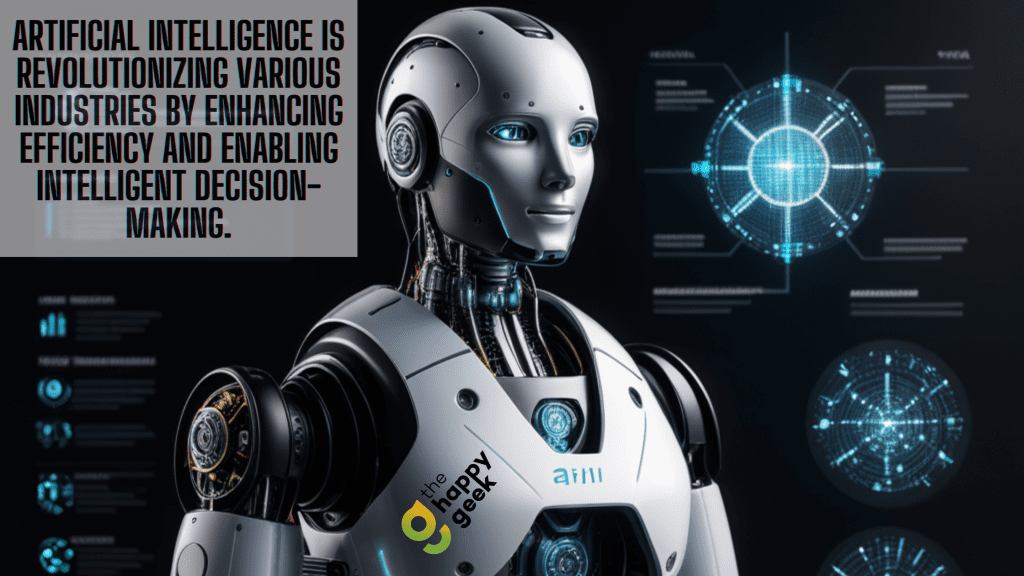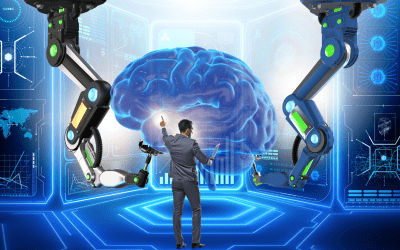Why Top Companies Are Using AI and How You Can Too

Table of Contents
Introduction
Artificial Intelligence (AI) is a rapidly evolving technology that has revolutionized various industries, including business. In simple terms, AI refers to the development of intelligent machines that can perform tasks without human intervention. These machines are designed to mimic human cognitive functions such as learning, problem-solving, and decision-making.
In today’s competitive landscape, AI has become increasingly important for businesses to stay ahead of the curve. It offers numerous benefits and opportunities for companies of all sizes and across industries. From automating repetitive tasks to analyzing massive amounts of data in real-time, AI has the potential to transform the way businesses operate.
One of the key reasons why top companies are embracing AI is its ability to enhance efficiency and productivity. By leveraging AI technologies, businesses can streamline their operations, reduce costs, and improve overall performance. For instance, AI-powered chatbots can handle customer inquiries round-the-clock, freeing up human resources for more complex tasks. This not only improves customer satisfaction but also allows businesses to allocate their workforce more strategically.
Moreover, AI enables businesses to make data-driven decisions by analyzing vast amounts of information quickly and accurately. Traditional methods of data analysis often require significant time and effort from human analysts. With AI algorithms and machine learning models, businesses can process large datasets in a fraction of the time it would take humans.
Another advantage of incorporating AI into business processes is its ability to identify patterns and trends that may go unnoticed by humans. By analyzing historical data and recognizing correlations between variables, AI algorithms can provide valuable insights for better decision-making. For example, a retail company can use AI algorithms to analyze customer purchasing patterns and preferences in order to personalize marketing campaigns effectively.
Furthermore, top companies have successfully implemented AI in various aspects of their operations. Amazon‘s recommendation system is a prime example of how AI can enhance customer experience by suggesting products based on individual preferences and browsing history. Similarly, Google‘s search engine utilizes machine learning algorithms to provide users with the most relevant search results.
Implementing AI in your own business can unlock a myriad of opportunities. However, it is crucial to approach AI implementation strategically and thoughtfully. The first step is to identify areas within your business processes that can benefit from AI technologies. This could include automating repetitive tasks, improving customer service through chatbots, or optimising supply chain management.
Once you have identified the areas for AI implementation, the next step is to gather and analyze relevant data. AI algorithms rely on high-quality data for accurate decision-making. Therefore, it is essential to ensure that your data is clean, comprehensive, and up-to-date. This may involve investing in data collection tools or partnering with third-party providers.
After gathering the necessary data, businesses need to select appropriate AI technologies and models that align with their specific needs and goals. There are various types of AI technologies available, including machine learning, natural language processing (NLP), and computer vision. Choosing the right technology requires careful consideration of factors such as scalability, compatibility with existing systems, and ease of integration.
Once implemented, it is important to continuously monitor and evaluate the performance of AI systems. Regularly updating algorithms and models based on new data ensures that businesses stay at the forefront of technological advancements. Additionally, providing proper training to employees who will be working alongside AI systems is crucial for seamless integration and optimal utilization.
Benefits of AI for Businesses
Artificial Intelligence (AI) has revolutionized the way businesses operate, offering a wide range of benefits that can significantly enhance efficiency and productivity. By leveraging AI technologies, companies can streamline their processes, improve customer experiences, make data-driven decisions, and optimise resources to achieve cost savings. In this blog post, we will explore the various advantages of AI for businesses and how you can harness its power to propel your own organization forward.
Improved Efficiency and Productivity
One of the primary benefits of implementing AI in business operations is the significant improvement in efficiency and productivity. AI-powered systems are capable of automating repetitive tasks, freeing up valuable time for employees to focus on more strategic and creative endeavors. For instance, chatbots powered by natural language processing algorithms can handle customer inquiries and provide instant responses 24/7, reducing the need for human intervention. This not only enhances customer satisfaction but also allows your workforce to concentrate on more complex tasks that require critical thinking and problem-solving skills.
Moreover, AI can analyze vast amounts of data at a speed that surpasses human capabilities. This enables businesses to extract valuable insights from large datasets in real-time, facilitating faster decision-making processes. For example, machine learning algorithms can analyze customer behavior patterns to identify trends and preferences accurately. Armed with this information, businesses can tailor their marketing strategies or product offerings accordingly, leading to higher conversion rates and increased revenue.
Enhanced Customer Experience
Another significant advantage of integrating AI into business operations is the ability to deliver enhanced customer experiences. With AI-powered tools such as chatbots or virtual assistants, companies can provide personalized support round-the-clock without any delays or errors commonly associated with human intervention. These intelligent systems utilize natural language processing techniques to understand customer queries accurately and offer relevant solutions promptly.
Furthermore, AI-powered recommendation engines have become increasingly popular among e-commerce platforms. By analyzing user behavior data such as browsing history or purchase patterns, these engines suggest products or services tailored to individual preferences, ultimately enhancing the overall customer experience. This level of personalization not only improves customer satisfaction but also increases customer loyalty and drives repeat business.
Data-Driven Decision Making
In today’s data-driven world, making informed decisions is crucial for business success. AI plays a vital role in this aspect by providing businesses with the ability to analyze vast amounts of structured and unstructured data quickly and accurately. Machine learning algorithms can identify patterns, correlations, and trends that may go unnoticed by human analysts, enabling organizations to make data-driven decisions with greater precision.
For example, AI-powered predictive analytics can forecast future market trends based on historical data, helping businesses adapt their strategies accordingly. This allows companies to stay one step ahead of their competitors and seize opportunities before they arise. Additionally, AI-powered analytics tools can monitor key performance indicators (KPIs) in real-time, providing valuable insights into operational efficiency and identifying areas for improvement.
Cost Savings and Resource Optimisation
Implementing AI technologies can lead to significant cost savings for businesses while optimising resources. By automating repetitive tasks that were previously performed manually by employees, companies can reduce labor costs and allocate their workforce to more value-added activities. This not only improves productivity but also eliminates the risk of human error associated with manual processes.
Furthermore, AI-powered systems can optimise resource allocation by analyzing data patterns and demand forecasts. For instance, machine learning algorithms can predict inventory requirements accurately based on historical sales data, ensuring optimal stock levels without excessive overstock or shortages. This prevents unnecessary expenses associated with excess inventory or missed sales opportunities due to stockouts.
Examples of Successful AI Implementation in Top Companies
Artificial Intelligence (AI) has revolutionised the way businesses operate, and top companies across various industries have embraced this technology to drive innovation and achieve remarkable success. By leveraging AI, these companies have been able to enhance their operations, improve customer experiences, and gain a competitive edge in the market. In this section, we will explore some notable examples of successful AI implementation in top companies.
One of the most well-known examples of AI implementation is seen in Amazon’s personalized recommendations. Through sophisticated machine learning algorithms, Amazon analyzes vast amounts of customer data to understand their preferences and behavior patterns. This enables them to provide highly accurate product recommendations tailored to each individual user. By using AI-powered recommendation systems, Amazon has significantly increased customer engagement and sales revenue.
Another company that has harnessed the power of AI is Netflix. The streaming giant utilizes advanced algorithms to analyze user data and provide personalized content recommendations. By analyzing viewing history, ratings, and other factors, Netflix is able to suggest relevant movies and TV shows that align with users’ interests. This personalized approach has played a crucial role in retaining subscribers and keeping them engaged on the platform.
Google is another prime example of successful AI implementation. The search engine giant employs complex machine learning algorithms to deliver highly relevant search results to users. Google’s algorithms constantly evolve based on user feedback, ensuring that search queries are matched with the most accurate information available on the web. This continuous improvement in search algorithms has made Google the go-to search engine for billions of users worldwide.
In addition to e-commerce, entertainment, and search engines, AI has also made significant advancements in the automotive industry. Tesla stands out as a pioneer in self-driving technology powered by AI. Tesla’s vehicles are equipped with sensors, cameras, and advanced neural networks that enable them to perceive their surroundings and make autonomous driving decisions. Through continuous data analysis and machine learning capabilities, Tesla’s self-driving technology continues to improve over time.
These examples demonstrate the immense potential of AI in transforming businesses and industries. The successful implementation of AI has allowed these companies to streamline operations, improve efficiency, and deliver personalized experiences to their customers. However, it is important to note that implementing AI in your own business requires careful planning and execution.
To implement AI in your business, you need to start by identifying areas where AI can add value and solve existing challenges. This could be in customer service, supply chain management, or data analysis, among other areas. Once you have identified the use cases, you can begin exploring different AI technologies and solutions that align with your business goals.
Next, it is essential to gather and prepare the necessary data for AI implementation. High-quality data is crucial for training machine learning models effectively. This involves collecting relevant data points, cleaning and organizing the data, and ensuring its accuracy and completeness.
After gathering the data, you can proceed with selecting or developing suitable AI algorithms or models. Depending on your specific requirements, you may choose from a range of options such as supervised learning, unsupervised learning, or reinforcement learning algorithms. It is important to evaluate the performance of different models before finalizing the one that best suits your needs.
Once you have selected an AI model, it needs to be trained using the prepared dataset. This process involves feeding the algorithm with labelled or unlabeled data to enable it to learn patterns and make accurate predictions or decisions. The training phase may require iterations and adjustments to optimise the model’s performance.
After training the model, it is time for deployment within your business environment. This involves integrating the AI solution into existing systems or workflows seamlessly. It is crucial to ensure compatibility with other software applications and hardware infrastructure.
Finally, continuous monitoring and evaluation are vital for maintaining the optimal performance of your AI implementation. Regularly assess its effectiveness against predefined metrics and make necessary adjustments if needed. Additionally, stay updated on advancements in AI technology to leverage new opportunities and stay ahead of the competition.
Implementing AI in Your Business
Artificial Intelligence (AI) has become a game-changer for businesses across various industries. It offers the potential to automate processes, improve decision-making, and unlock new opportunities. If you’re wondering how to use AI efficiently in your business, this article will guide you through the steps to implement AI successfully.
Assessing your business needs
Before diving into AI implementation, it’s crucial to assess your business needs and identify areas where AI can add value. Start by analyzing your existing processes and identifying pain points or inefficiencies that could benefit from automation or intelligent decision-making.
Setting clear goals and objectives is essential for a successful AI implementation. Determine what specific outcomes you want to achieve with AI, such as reducing operational costs, improving customer experience, or increasing productivity. By clearly defining your goals, you can align your AI strategy accordingly.
Choosing the right AI solution
Once you have identified the areas where AI can make a difference in your business, the next step is to choose the right AI solution. There are various AI technologies available in the market today, each with its own strengths and limitations.
Evaluate different AI technologies based on factors like scalability, compatibility with existing systems, and cost-effectiveness. Consider whether you need machine learning algorithms for predictive analytics or natural language processing capabilities for chatbots and virtual assistants. Engage with experts or consult reputable vendors who can guide you in selecting the most suitable solution for your business needs.
Data collection and preparation
Data is the fuel that powers AI algorithms. To implement effective AI models, you need access to relevant and high-quality data. Start by collecting data from various sources within your organization – customer interactions, sales transactions, website analytics, etc.
However, not all data may be useful or suitable for training an AI model. Cleaning and organizing data is a critical step in preparing it for analysis by AI algorithms. Remove any duplicate or irrelevant data, and ensure consistency in data formats. This process may involve data cleansing techniques like standardization, normalization, and outlier removal.
Implementing and testing AI models
With your business needs assessed, the right AI solution chosen, and the data collected and prepared, it’s time to implement and test AI models. Developing AI models tailored to your specific business needs is crucial for optimal performance.
Start by selecting appropriate algorithms based on your objectives – whether it’s classification, regression, clustering, or recommendation systems. Train the selected algorithms using the cleaned and organized data collected earlier. The training process involves feeding the algorithm with labelled or historical data to learn patterns and make predictions.
Once the AI models are developed, it’s essential to test them thoroughly before deploying them in a live environment. Testing helps identify any issues or inaccuracies in the models’ predictions. Refine the models based on feedback from testing to improve their accuracy and reliability.
Implementing AI in your business requires a systematic approach that involves assessing your needs, choosing the right solution, collecting and preparing data, and implementing and testing AI models. By following these steps diligently, you can unlock new opportunities for growth and efficiency in your business.
Remember that the successful implementation of AI is an ongoing process. Continuously monitor the performance of your AI models and make necessary adjustments as your business evolves. With proper planning, execution, and continuous improvement, you can harness the power of AI to drive success in your business just like top companies have done.
Unlocking New Opportunities with AI
Artificial Intelligence (AI) has revolutionized the way businesses operate, offering a multitude of benefits and unlocking new opportunities. By harnessing the power of AI, companies can identify new revenue streams, improve customer targeting and personalization, automate repetitive tasks, and gain a competitive advantage in their respective industries.
One of the key advantages of using AI in business is the ability to identify new revenue streams. With AI-powered tools and algorithms, companies can analyze vast amounts of data to uncover hidden patterns and trends. This allows businesses to identify untapped markets or niche opportunities that were previously overlooked. For example, retail companies can use AI to analyze customer purchase history and preferences to recommend personalized products or services, increasing sales and customer satisfaction.
In addition to identifying new revenue streams, AI also enables businesses to improve customer targeting and personalization. By analyzing customer data such as browsing behaviour, purchase history, and social media interactions, companies can gain valuable insights into their customers’ preferences and interests. This information can then be used to tailor marketing campaigns and deliver personalized recommendations or offers. For instance, e-commerce platforms can leverage AI algorithms to provide customers with personalized product recommendations based on their past purchases or browsing history.
Automation is another area where AI can unlock new opportunities for businesses. Repetitive tasks that are time-consuming and prone to human error can be automated using AI-powered systems. This not only frees up employees’ time for more strategic tasks but also improves efficiency and accuracy. For example, customer service departments can utilize chatbots powered by natural language processing algorithms to handle common inquiries or provide initial support before escalating complex issues to human agents. This allows businesses to provide round-the-clock support while reducing costs associated with staffing large customer service teams.
Moreover, implementing AI in business operations provides a competitive advantage by enabling companies to make data-driven decisions quickly and accurately. With real-time analytics powered by AI algorithms, businesses can monitor market trends, track competitors’ activities, and identify potential risks or opportunities. This allows companies to stay ahead of the curve and respond promptly to changing market conditions. For instance, financial institutions can use AI algorithms to analyze market data and make informed investment decisions based on predictive analytics.
In conclusion, AI offers numerous benefits for businesses, unlocking new opportunities in various aspects of operations. By leveraging AI technology, companies can identify new revenue streams, improve customer targeting and personalization, automate repetitive tasks, and gain a competitive advantage. The key lies in harnessing the power of AI to analyze vast amounts of data and extract actionable insights that drive business growth. As more top companies embrace AI, it is crucial for businesses of all sizes to explore how they can incorporate this transformative technology into their operations to stay competitive in the evolving business landscape.
If you need any assistance to implement Artificial Intelligence Tools into your business, reach out to us. Book a Call and we will be more than happy to assist.
For more Stories and Tech updates, check out our other blogs.




0 Comments